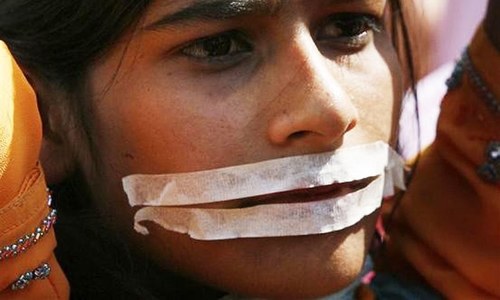ISLAMABAD: Even though laws to prevent domestic violence already exist in the provinces, none of these laws – existing or proposed – have generated as much controversy and opposition as the recently-passed Punjab Protection of Women against Violence Act, 2016.
This is surprising, since the law contains very little in the way of new stipulations that were not envisioned by previous laws. Its detractors, such as the Council of Islamic Ideology (CII), claim that by passing the bill, the provincial legislature has committed ‘a treasonous act’.
According to Human Rights Commission of Pakistan Chairperson Zohra Yusuf, “Violence against women is so widespread in Pakistan that this certainly needed to be addressed.”
In her opinion, the Pakistan Penal Code (PPC) already provides remedies for violent crimes against a person, be it a man or a woman.
“But there are no laws to provide relief to women victims of domestic violence. Therefore, it was necessary to have special mechanisms and interventions for women and children,” says Punjab Commission on the Status of Women chairperson Fauzia Viqar.
Unlike the Sindh law against domestic violence, the Punjab law does not criminalise domestic violence itself, but rather provides civil remedies such as fines or residence orders through the courts. Violators can only be imprisoned for a violation of a court order, not for abuse.
Despite loud opposition, Punjab domestic violence act contains few stipulations not contained in existing laws
But how can a case be registered under an act that does not criminalise domestic violence? According to leading human rights lawyer Asma Jahangir, domestic violence is a “civil matter” under the Punjab act and complainants must turn to a protection officer or the family courts to register a case, not the police.
The onus of proof is not as high when it comes to proving cases under acts such as this, she said.
Recently, a case that was purportedly registered under the new bill made headlines across the country. However, since the new domestic violence law is yet to be activated, the case was, in fact, filed under the relevant section of the PPC, and subsequently quashed on the complainant’s request.
Misguided opposition?
The law’s opponents also insist that drawing up legislation that caters specifically to women – which is also what the Sindh law does – is unfair to men.
A CII official hinted at the reason behind their recent rejection of both the KP and Punjab bill. The English draft of the law uses the general term ‘aggrieved person’ and also defines the kinds of aggrieved persons, which also includes men.
“The translation of the KP law that we received refers to the ‘aggrieved person’ as ‘mutasira’, the feminine term for victim,” he said. This indicates that those opposing the law may not necessarily be clear on what exactly it stipulates.
Fresh aspects
The Punjab law does feature uniquely specific definitions. Its explanation of psychological violence “includes psychological deterioration of aggrieved person which may result in anorexia [emphasis added], suicide attempt or clinically proven depression”. The law thereby identifies connections between mental health issues, such as anorexia or depression, and domestic abuse.
The Punjab act has also made the home a scrutable area. “Earlier, homes were treated as a private space and domestic violence was again a private matter, so now [the police] can enter a home where reports originate from,” Ms Yusuf said.
However, she criticised the provision that the defendant will be asked to leave the house for two days, saying it may be ineffective if he is allowed to return and continued abusing the victim.
Similar to the acts that came before it, the 2016 act also calls for residence and financial support for victims.
However, where the Sindh act states that a victim cannot be evicted from the household without consent, Clause 5 of the Punjab act states that the court can restore the position of a victim who has been wrongfully evicted if “the aggrieved person has right, title of beneficial interest in the house”.
Enforcement mechanisms
What sets this law apart from the rest is extensive enforcement mechanisms. According to Mumtaz Mughal of the Aurat Foundation, it is much more realistic to expect that the law will be implemented and enforced better than the laws passed by other provinces.
The law calls for the constitution of Women Protection committees at the district-level, which will consist of a police representative, a social welfare officer, a public prosecutor, civil society representatives and a district women protection officer who will act as the secretary.
Ms Viqar of the Punjab Commission on the Status of Women explained that the district protection officer will be a paid officer, and the government functionaries in the committee would already be drawing a salary from the government, while members who are from the civil society will be working on a purely voluntary basis.
But even she was not clear on how quickly these mechanisms will be created. The law itself provides the government 120 days to make rules and set up the relevant functions under the act, such as a toll-free helpline, District Women Protection committees, and legal, psychological assistance and shelter.
The government has yet to constitute district women protection committees, and the process will entail advertising for appointments in the committees and the receiving and vetting of applications.
Published in Dawn, March 9th, 2016
















































